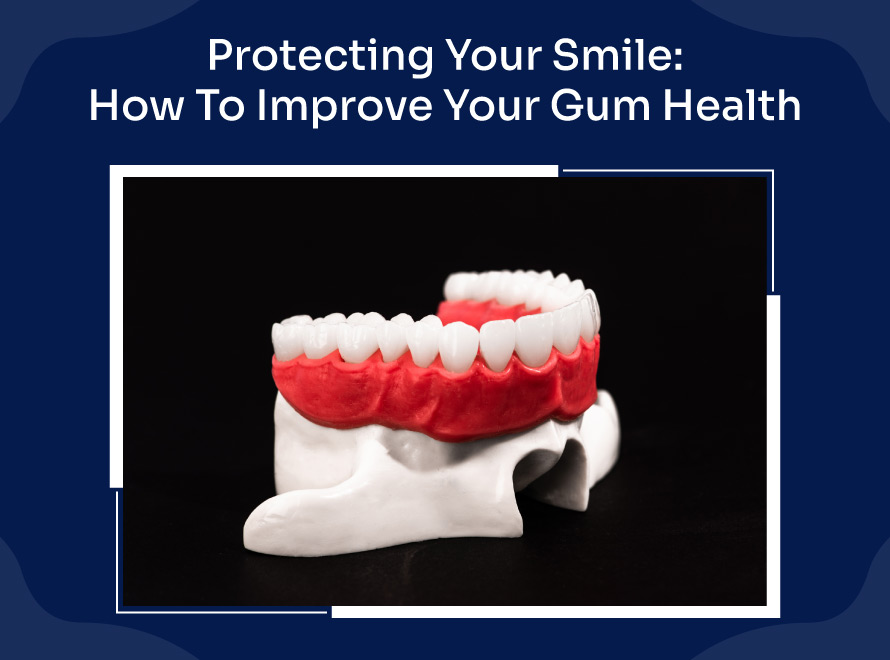Protecting your gum health is vital for maintaining a beautiful and functional smile. By recognising the signs of gum disease and adopting good oral hygiene practices, you can significantly improve your gum health and prevent serious dental issues. Let’s understand how to improve gum health, safeguarding your teeth and overall well-being for years to come.
A] The Connection Between Gum Health and Strong Teeth
The anatomy of gums and teeth plays a crucial role in maintaining oral health. Gums, or gingiva, are the soft tissues that surround and protect the teeth and their roots. They form a seal around each tooth, providing a barrier against bacteria and supporting the underlying bone structure. To learn how to get healthy gums, it’s essential to recognise that healthy gums are typically firm and pink, while unhealthy gums may appear swollen or bleed easily.
Teeth consist of several layers, including enamel, dentin, and pulp. Enamel is the hard outer layer that protects teeth from decay. Healthy gums and periodontal ligaments anchor teeth securely in the jawbone, ensuring their stability. This interconnected system is vital for chewing, speaking, and overall oral functionality.
However, gum disease, particularly periodontal disease, poses significant risks to both gums and teeth. When plaque – a sticky film of bacteria – builds up on teeth and gums, it can lead to inflammation and infection. If left untreated, this can progress to periodontal disease, causing the gums to pull away from the teeth, resulting in tooth mobility and even tooth loss.
Maintaining good oral hygiene – through regular brushing, flossing, and dental checkups – is essential for keeping both gums and teeth healthy. By following tips for healthy gums and addressing gum health alongside tooth care, you can prevent long-term dental issues and ensure a strong, beautiful smile for years to come.
Ready to improve your gum health? Start your journey today!
B] Identifying Signs of Gum and Teeth Problems
Recognising the early signs of gum and teeth problems is essential for maintaining oral health and knowing how to keep healthy gums. Here are some common indicators to watch for:
-
- Receding Gums: This occurs when the gum tissue begins to pull away from the teeth, exposing more of the tooth surface and roots. Receding gums can lead to increased sensitivity and a greater risk of decay or infection.
-
- Swollen Gums: Healthy gums are firm and pink. If your gums appear red and swollen or feel tender, this may indicate inflammation because of plaque buildup, often a sign of gingivitis, the earliest stage of gum disease.
-
- Loose Teeth: Suppose you notice that your teeth feel loose or shift position. This could be a sign of advanced gum disease or bone loss. Loose teeth require immediate attention from a dentist to prevent further complications.
-
- Persistent Bad Breath: Foul-smelling breath, or halitosis, can result from bacteria in the mouth or gum disease. If brushing and mouthwash do not improve your breath, it may be a sign of an underlying dental issue.
-
- Tooth Sensitivity: Increased sensitivity to hot or cold foods and drinks can indicate gum recession or damage to the tooth enamel, potentially leading to cavities or gum disease.
- Toothache: Persistent pain in a tooth or surrounding gums may signify decay, infection, or gum disease. Don’t ignore toothaches; they often require professional diagnosis and treatment. In some cases, you might need root canal treatment in Vile Parle East to address the underlying issues and alleviate your pain.
C] Tips for Healthy Gums
Here are some practical ways to improve gum health and ensure your gums remain strong and healthy:
Brush Properly
Use a soft-bristled toothbrush and fluoride toothpaste, as fluoride strengthens tooth enamel and helps prevent decay. Aim to brush for at least two minutes, twice a day. Use gentle, circular motions, focusing on the gum line where plaque tends to accumulate. Be sure to brush the inner and outer surfaces of each tooth, as well as your tongue, to remove bacteria and freshen your breath. Don’t forget to replace your toothbrush every three to four months or sooner if the bristles become frayed.
Choose The Right Toothpaste
Selecting the right toothpaste can make a significant difference in maintaining what helps gum health. Look for toothpaste containing fluoride, which helps strengthen teeth and protect against cavities. Additionally, consider options with antibacterial properties that target plaque and gingivitis. If you have sensitive gums or teeth, opt for toothpaste formulated for sensitivity to minimise discomfort while brushing. Reading the labels can help you make an informed choice about the best toothpaste for your needs.
Floss Daily
Flossing is an essential part of your oral hygiene routine, as it removes plaque and food particles from between your teeth and below the gum line, areas that your toothbrush can’t reach. Aim to floss at least once a day, ideally before bedtime. Use roughly 18 inches of dental floss, wrapping it around your fingers for better control. Slide the floss softly and gently between your teeth, twisting it around each tooth in a C-shape to ensure you clean below the gum line effectively. If traditional floss is challenging to use, consider dental picks or water flossers as alternatives.
Use Mouthwash
Incorporating an antibacterial mouthwash into your routine can provide additional protection for your gums. Mouthwash helps reduce plaque, freshen breath, and reach areas that brushing and flossing may miss. Choose an alcohol-free mouthwash to avoid drying out your mouth, which can contribute to gum problems. Rinse with mouthwash after brushing and flossing to enhance your oral care routine.
Get Regular Dental Checkups
If you’re thinking, how can I make my gums healthy? Then, regular dental visits are your answer. Schedule checkups every 6 months for professional cleanings and examinations. During these visits, your dentist can remove tartar and plaque that regular brushing and flossing may not eliminate. They will also check your gum health, identifying any early signs of gum disease, such as inflammation or pockets between the teeth and gums. Early detection allows for timely intervention, preventing more severe dental issues down the line. Additionally, if you’re considering cosmetic improvements, inquire about Dental veneers in Vile Parle East to enhance your smile.
Stop Smoking
Smoking is a significant risk factor for gum disease, as it weakens your immune system and makes it harder for your gums to heal. If you smoke, quitting can greatly improve your gum health and overall oral hygiene. There are numerous resources available to help you quit, including support groups, counselling, and nicotine replacement therapies. By stopping smoking, you’ll reduce your susceptibility to gum diseases, significantly enhancing your oral health.
Healthy Diet
A balanced diet rich in vitamins and minerals supports strong gums and teeth. To understand how to keep gums healthy, incorporate plenty of fruits and vegetables, especially those high in vitamin C, such as oranges, strawberries, and bell peppers. Vitamin C is essential for gum health as it helps strengthen gum tissue and reduces inflammation. Additionally, consume calcium-rich foods like dairy products, leafy greens, and fortified plant-based alternatives to support strong teeth.
Limit your intake of sugary foods and beverages, as sugar feeds the bacteria that cause plaque and gum disease. Instead, opt for healthy snacks like nuts, raw vegetables, and whole grains. Staying hydrated is equally essential; drinking plenty of water helps wash away food particles and bacteria, keeping your mouth clean.
Ready to improve your gum health? Start your journey today!
Conclusion
If you’re wondering how to strengthen your gums, start by recognising the signs of gum disease and incorporating good oral hygiene practices—such as proper brushing, flossing, and regular dental checkups—into your routine.
Adopting a balanced diet and quitting smoking can ensure your gums stay healthy and strong. Start with these gum health tips to improve your gum health and protect your smile for years to come. Book your appointment with a dentist in Vile Parle East today!

Dr. Dipika Bharani
Dr. Dipika Bharani, founder of Dentalfix Clinic in Vile Parle East, is an expert in cosmetic dentistry, including smile designing and teeth whitening. With advanced training from international universities, she is skilled in wisdom tooth surgeries, TMJ disorders, and trauma-related dental care, offering comprehensive solutions for a wide range of dental needs. Read More

